About the experts (in alphabetic order by last name):
 Nancy Barcal, M.A., CCC-SLP, is the Founding Director of Granite Bay Speech and has over 32 years experience treating individuals who stutter and clutter. Nancy received her Bachelor’s Degree from Bradley University, (Peoria, Illinois) and her Master’s Degree from Northern Illinois University, (DeKalb, Illinois). The National Stuttering Association (NSA) recognized her as the 2009 Chapter Leader of the Year. Nancy has been an active member of the NSA since 1983. She is a member of ASHA’s Fluency Disorders Special Interest Group. Nancy is a frequent guest speaker on the subject of fluency disorders and counseling techniques at Northern California school districts, hospitals, and Sacramento State University (Sacramento, California). She recently presented, “Providing the Best Care for Your Client Who Stutters” at the National Student Speech and Hearing Association Conference in Sacramento, California. Nancy has developed clinical fluency evaluation and treatment guidelines for the insurance industry. She has worked in home health, schools and hospitals, as well as, private practice. Nancy works with the Roseville Theatre Group to provide opportunities for people who stutter to volunteer in the theatre for generalization of skills. She is passionate about increasing awareness of fluency disorders and advocating for better treatment options. Nancy Barcal, M.A., CCC-SLP, is the Founding Director of Granite Bay Speech and has over 32 years experience treating individuals who stutter and clutter. Nancy received her Bachelor’s Degree from Bradley University, (Peoria, Illinois) and her Master’s Degree from Northern Illinois University, (DeKalb, Illinois). The National Stuttering Association (NSA) recognized her as the 2009 Chapter Leader of the Year. Nancy has been an active member of the NSA since 1983. She is a member of ASHA’s Fluency Disorders Special Interest Group. Nancy is a frequent guest speaker on the subject of fluency disorders and counseling techniques at Northern California school districts, hospitals, and Sacramento State University (Sacramento, California). She recently presented, “Providing the Best Care for Your Client Who Stutters” at the National Student Speech and Hearing Association Conference in Sacramento, California. Nancy has developed clinical fluency evaluation and treatment guidelines for the insurance industry. She has worked in home health, schools and hospitals, as well as, private practice. Nancy works with the Roseville Theatre Group to provide opportunities for people who stutter to volunteer in the theatre for generalization of skills. She is passionate about increasing awareness of fluency disorders and advocating for better treatment options. |
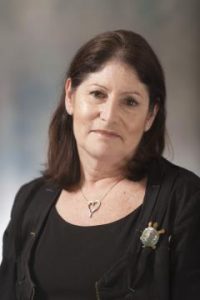 Nan Bernstein Ratner is Professor, Department of Hearing and Speech Sciences, University of Maryland, College Park. She is a Fellow and Honors recipient of the American Speech, Language and Hearing Association (ASHA). In 2014, she was made a Fellow of the American Association for the Advancement of Science (AAAS). Her primary areas of research are fluency development and disorder (stuttering), psycholinguistics and the role of adult input and interaction in child language development. The author of numerous research articles, chapters and edited texts, she is the co-author of A Handbook on Stuttering (6th ed) with the late Oliver Bloodstein, as well as The Development of Language (7th ed) and Psycholinguistics (2nd ed.), both with Jean Berko Gleason. She is a Board-recognized Specialist in Child Language Disorders. In 2006, Professor Bernstein Ratner received the Distinguished Researcher award from the International Fluency Association. She currently serves as its President-Elect.In 2016, Dr. Bernstein Ratner was named Professional of the Year by the National Stuttering Association. Nan Bernstein Ratner is Professor, Department of Hearing and Speech Sciences, University of Maryland, College Park. She is a Fellow and Honors recipient of the American Speech, Language and Hearing Association (ASHA). In 2014, she was made a Fellow of the American Association for the Advancement of Science (AAAS). Her primary areas of research are fluency development and disorder (stuttering), psycholinguistics and the role of adult input and interaction in child language development. The author of numerous research articles, chapters and edited texts, she is the co-author of A Handbook on Stuttering (6th ed) with the late Oliver Bloodstein, as well as The Development of Language (7th ed) and Psycholinguistics (2nd ed.), both with Jean Berko Gleason. She is a Board-recognized Specialist in Child Language Disorders. In 2006, Professor Bernstein Ratner received the Distinguished Researcher award from the International Fluency Association. She currently serves as its President-Elect.In 2016, Dr. Bernstein Ratner was named Professional of the Year by the National Stuttering Association.
With Brian MacWhinney of Carnegie-Mellon University, Dr. Ratner manages FluencyBank, a project of TalkBank (www.Talkbank.org). This initiative will track fluency development in typical children, those who stutter, late-talking children and children raised bilingually. In addition, FluencyBank seeks to archive and facilitate sharing of data relevant to fluency research. |
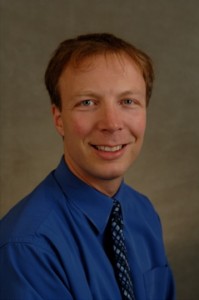 Paul Blanchet is an Associate Professor at Baylor University. He earned his Ph.D. from Louisiana State University in 2002, and his primary area Paul Blanchet is an Associate Professor at Baylor University. He earned his Ph.D. from Louisiana State University in 2002, and his primary areaof specialization is fluency disorders. Prior to joining the Baylor faulty in 2012, Dr. Blanchet held faculty appointments at the State University of New York at Fredonia and Louisiana State University Health Sciences Center. He is also a certified speech-language pathologist, as well as a person who stutters. Dr. Blanchet’s current research examines students’ perceptions of speakers who stutter and/or clutter. Future research projects will incorporate physiological measures to more fully assess listeners’ reactions to listening to disfluent speech. |
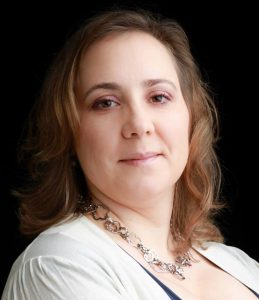 Jaqueline Carmona works as a lecturer in fluency disorders at the Department of Speech-Language Pathology at Health School in Higher Education at Acoitão which she combines with her clinical work. Clinically she focuses on screening, diagnosis and treatment of stuttering at PIN – Progresso Infantil in Portugal. She also gives workshops on fluency disorders for SLT’s, but also for other professionals, teacher’s, kindergarten educators among others. Jaqueline Carmona works as a lecturer in fluency disorders at the Department of Speech-Language Pathology at Health School in Higher Education at Acoitão which she combines with her clinical work. Clinically she focuses on screening, diagnosis and treatment of stuttering at PIN – Progresso Infantil in Portugal. She also gives workshops on fluency disorders for SLT’s, but also for other professionals, teacher’s, kindergarten educators among others.
She did the European Clinical Specialization in Fluency Disorders – ECSF in 2009. Actually,
she is an ECSF Staff member and was recognized as a European Fluency Specialist by EFS. She is a Ph.D. Student at Catholic University in Lisbon – Health Sciences Institute, her research is about stuttering disorders. |
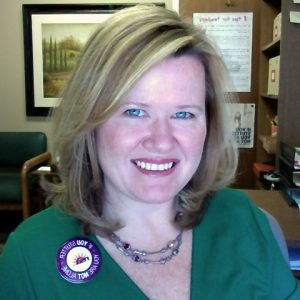 Ms. Tricia Hedinger is a clinical Assistant Professor at the University of Tennessee Health Science Center in Knoxville, TN. She specializes in stuttering disorders for children, adolescents and adults. She is the Chapter Leader for the National Stuttering Association Support Group in East Tennessee and is an active member of the Special Interest Group for Fluency Disorders. She consults with schools and SLPs throughout the southeast United States on the evaluation and treatment of people who stutter and has published multiple articles on topics related to stuttering and clinical education. Ms. Hedinger also directs the UT Volunteer Your Voice Summer Camp for children ages 8-16 with speech, language and/or hearing impairments. Ms. Tricia Hedinger is a clinical Assistant Professor at the University of Tennessee Health Science Center in Knoxville, TN. She specializes in stuttering disorders for children, adolescents and adults. She is the Chapter Leader for the National Stuttering Association Support Group in East Tennessee and is an active member of the Special Interest Group for Fluency Disorders. She consults with schools and SLPs throughout the southeast United States on the evaluation and treatment of people who stutter and has published multiple articles on topics related to stuttering and clinical education. Ms. Hedinger also directs the UT Volunteer Your Voice Summer Camp for children ages 8-16 with speech, language and/or hearing impairments. |
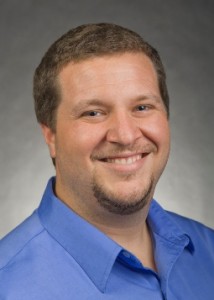 Dan Hudock, Ph.D., Certificate of Clinical Competence of Speech-Language Pathology (CCC-SLP), is an Associate Professor at Idaho State University in Pocatello, Idaho, USA. As a person who stutters himself, he is very passionate about fluency disorders and helping those with fluency disorders. One aspect of his research interests is in exploring effective collaborations between Speech-Language Pathologists and Mental Health Professionals for the treatment of people who stutter. He is also Director of the Northwest Center for Fluency Disorders, which hosts a two-week interprofessional intensive clinic that uses Acceptance and Commitment Therapy (ACT). For more information about research, clinical, or support opportunities please visit http://www.northwestfluency.org/. Dan Hudock, Ph.D., Certificate of Clinical Competence of Speech-Language Pathology (CCC-SLP), is an Associate Professor at Idaho State University in Pocatello, Idaho, USA. As a person who stutters himself, he is very passionate about fluency disorders and helping those with fluency disorders. One aspect of his research interests is in exploring effective collaborations between Speech-Language Pathologists and Mental Health Professionals for the treatment of people who stutter. He is also Director of the Northwest Center for Fluency Disorders, which hosts a two-week interprofessional intensive clinic that uses Acceptance and Commitment Therapy (ACT). For more information about research, clinical, or support opportunities please visit http://www.northwestfluency.org/. |
 Pallavi Kelkar, a Speech Language Pathologist from Pune, India. After completing my Bachelor’s degree in Audiology and Speech Language Pathology, I went on to do a Master’s and then a PhD. I have completed my doctoral work in the area of fluency disorders and my thesis is currently under evaluation. Pallavi Kelkar, a Speech Language Pathologist from Pune, India. After completing my Bachelor’s degree in Audiology and Speech Language Pathology, I went on to do a Master’s and then a PhD. I have completed my doctoral work in the area of fluency disorders and my thesis is currently under evaluation.Because of my special interest in fluency disorders, I have conducted awareness programmes in the past, as well as started a self- help group for persons with stuttering. I have completed a basic and an advanced certificate course in Rational Emotive Behavior Therapy and have found principles of this therapy really useful for helping my patients cope with stuttering.
I have presented and published papers in fluency and other areas at national and international conferences and scientific journals.
I have recently developed a tool for evaluation of the impact of fluency disorders (stuttering and cluttering) based on the ICF. The tool measures impact from two perspectives- that of the person with stuttering and that of their significant others.
|
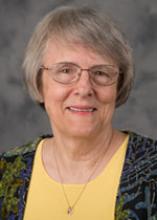 Judith Kuster CCC-SLP, BCSF-R, M.S. in speech-language pathology and M.S. in counseling, is an ASHA Fellow and emeritus professor of Communication Disorders at Minnesota State University, Mankato. She has maintained the Stuttering Home Page (http://www.mnsu.edu/comdis/kuster/stutter.html) for the past 22 years (starting as a Gopher site) and put together the ISAD online conferences from 1998-2012. Kuster is a member of the ASHA Special Interest Group #4: Fluency and Fluency Disorders and the International Stuttering Association. She is the recipient of the two Fulbright Specialist Awards (Bulgaria 2007 and China 2010) and has presented on fluency disorders nationally and Internationally. She was awarded the ASHF DiCarlo Award for Outstanding Clinical Achievement, the 2003 IFA Distinguished Contributor Award, the 2007 ISA Outstanding Contribution Award, the 2008 ASHA Distinguished Contributor Award, in 2009 was named to the National Stuttering Association’s Hall of Fame, the 2009 MSU, Mankato Global Citizen Award, and Bethany Lutheran College 2017 Alumna of the Year. Judith Kuster CCC-SLP, BCSF-R, M.S. in speech-language pathology and M.S. in counseling, is an ASHA Fellow and emeritus professor of Communication Disorders at Minnesota State University, Mankato. She has maintained the Stuttering Home Page (http://www.mnsu.edu/comdis/kuster/stutter.html) for the past 22 years (starting as a Gopher site) and put together the ISAD online conferences from 1998-2012. Kuster is a member of the ASHA Special Interest Group #4: Fluency and Fluency Disorders and the International Stuttering Association. She is the recipient of the two Fulbright Specialist Awards (Bulgaria 2007 and China 2010) and has presented on fluency disorders nationally and Internationally. She was awarded the ASHF DiCarlo Award for Outstanding Clinical Achievement, the 2003 IFA Distinguished Contributor Award, the 2007 ISA Outstanding Contribution Award, the 2008 ASHA Distinguished Contributor Award, in 2009 was named to the National Stuttering Association’s Hall of Fame, the 2009 MSU, Mankato Global Citizen Award, and Bethany Lutheran College 2017 Alumna of the Year. |
 Charlie Osborne is a clinical associate professor at the University of Wisconsin – Stevens Point. He teaches the fluency disorders class and mentors graduate students working with people who stutter and their families. Charlie has worked with people who stutter for over 30 years. He is a NSA Adult Chapter Leader. Charlie Osborne is a clinical associate professor at the University of Wisconsin – Stevens Point. He teaches the fluency disorders class and mentors graduate students working with people who stutter and their families. Charlie has worked with people who stutter for over 30 years. He is a NSA Adult Chapter Leader. |
 Dr. Scott Palasik has been a Certified Speech-Language Pathologist for fifteen years. He’s an Assistant Professor at the University of Akron (UA) where he teacher graduate Fluency Disorders course (on campus and distance learning), Voice Disorders and Cleft Palate, and Support Systems for Families and Individuals with Communication Disorders, along with supervising graduate students in clinical Education. He also is the director of the Mindfulness ACT Somatic Stuttering Lab, and performs research with Acceptance and Commitment Therapy (ACT), unconscious and conscious attitudes about stuttering, and environmental and social effects pertaining to dysphagia. He has presented at many local, regional, state, and national conventions about mindfulness and ACT. He has been a member of the ACBS (Association of Contextual Behavioral Sciences) for eight years and is the President of the Ohio ACBS Chapter. He is also the co-founder of the UA Campus walk for Suicide Prevention. Dr. Scott Palasik has been a Certified Speech-Language Pathologist for fifteen years. He’s an Assistant Professor at the University of Akron (UA) where he teacher graduate Fluency Disorders course (on campus and distance learning), Voice Disorders and Cleft Palate, and Support Systems for Families and Individuals with Communication Disorders, along with supervising graduate students in clinical Education. He also is the director of the Mindfulness ACT Somatic Stuttering Lab, and performs research with Acceptance and Commitment Therapy (ACT), unconscious and conscious attitudes about stuttering, and environmental and social effects pertaining to dysphagia. He has presented at many local, regional, state, and national conventions about mindfulness and ACT. He has been a member of the ACBS (Association of Contextual Behavioral Sciences) for eight years and is the President of the Ohio ACBS Chapter. He is also the co-founder of the UA Campus walk for Suicide Prevention. |
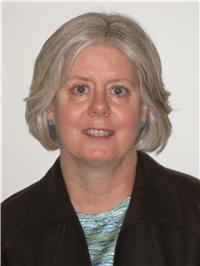 Jean Sawyer, Ph.D., CCC-SLP is an associate professor in Communication Sciences and Disorders at Illinois State University. She received her doctorate at the University of Illinois under the mentorship of Ehud Yairi. She teaches graduate and undergraduate courses in fluency, and serves as a consultant to speech-language pathologists who treat stuttering. The Illinois State chapter of the National Stuttering Association is a registered student organization, and Jean has helped organize it and is a co-chapter leader. Her research is in the characteristics of disfluencies, the distribution of disfluencies in stuttered speech, and treatment efficacy. Jean Sawyer, Ph.D., CCC-SLP is an associate professor in Communication Sciences and Disorders at Illinois State University. She received her doctorate at the University of Illinois under the mentorship of Ehud Yairi. She teaches graduate and undergraduate courses in fluency, and serves as a consultant to speech-language pathologists who treat stuttering. The Illinois State chapter of the National Stuttering Association is a registered student organization, and Jean has helped organize it and is a co-chapter leader. Her research is in the characteristics of disfluencies, the distribution of disfluencies in stuttered speech, and treatment efficacy. |
 Kathleen Scaler Scott, Ph.D., CCC-SLP, is an Associate Professor in the Department of Speech-Language Pathology at Misericordia University and a Board Certified Specialist in Fluency Disorders. She has been a practicing clinician for 24 years in hospital, school, and private practice settings. Dr. Scaler Scott has authored and co-authored several articles and book chapters on the topic of fluency disorders. She is co-editor of the textbook, Cluttering: A handbook of research, intervention, and education, and of the treatment manual Managing Cluttering: A comprehensive guidebook of activities, both with Dr. David Ward. She is author of the forthcoming book, Fluency Plus: Managing Fluency Disorders in Individual with Multiple Diagnoses. A certified special education and elementary school teacher, Dr. Scaler Scott was the first Coordinator of the International Cluttering Association. Kathleen Scaler Scott, Ph.D., CCC-SLP, is an Associate Professor in the Department of Speech-Language Pathology at Misericordia University and a Board Certified Specialist in Fluency Disorders. She has been a practicing clinician for 24 years in hospital, school, and private practice settings. Dr. Scaler Scott has authored and co-authored several articles and book chapters on the topic of fluency disorders. She is co-editor of the textbook, Cluttering: A handbook of research, intervention, and education, and of the treatment manual Managing Cluttering: A comprehensive guidebook of activities, both with Dr. David Ward. She is author of the forthcoming book, Fluency Plus: Managing Fluency Disorders in Individual with Multiple Diagnoses. A certified special education and elementary school teacher, Dr. Scaler Scott was the first Coordinator of the International Cluttering Association. |
 Vivian Sisskin, M.S., CCC-SLP, BCS-F, is a Clinical Professor at the University of Maryland, an ASHA Fellow, and Board Certified Specialist in Fluency Disorders. She received the Excellence in Teaching Award from the University of Maryland, and ASHA’s Media Champion award. She was named Speech-Language Pathologist of the Year by the National Stuttering Association. Sisskin served as Coordinator for ASHA’s Special Interest Group (Fluency), and on the Boards of Directors of the National Stuttering Association and The American Board on Fluency and Fluency Disorders. She is on the Professional Advisory Board of the Stuttering Foundation, and a faculty member for the Foundation’s Mid-Atlantic and University Instructors Workshops. She is the book review editor for the Journal of Fluency Disorders. Her articles and workshops cover treatment for stuttering, atypical speech fluency disorders, and communication strategies in autism. She is the owner of the Sisskin Stuttering Center in the Washington DC area. Vivian Sisskin, M.S., CCC-SLP, BCS-F, is a Clinical Professor at the University of Maryland, an ASHA Fellow, and Board Certified Specialist in Fluency Disorders. She received the Excellence in Teaching Award from the University of Maryland, and ASHA’s Media Champion award. She was named Speech-Language Pathologist of the Year by the National Stuttering Association. Sisskin served as Coordinator for ASHA’s Special Interest Group (Fluency), and on the Boards of Directors of the National Stuttering Association and The American Board on Fluency and Fluency Disorders. She is on the Professional Advisory Board of the Stuttering Foundation, and a faculty member for the Foundation’s Mid-Atlantic and University Instructors Workshops. She is the book review editor for the Journal of Fluency Disorders. Her articles and workshops cover treatment for stuttering, atypical speech fluency disorders, and communication strategies in autism. She is the owner of the Sisskin Stuttering Center in the Washington DC area. |
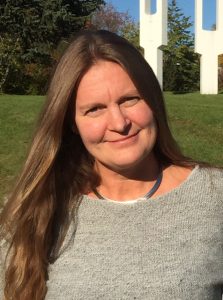 Hilda Sønsterud is a speech and language pathologist (SLP) in Oslo, Norway. She works at Statped, Department for speech and language disorders, and she is a PhD-fellow at the University of Oslo. Hilda works primarily with treatment and clinical research related to stuttering and cluttering. She runs courses within the field of stuttering and cluttering, and she provides clinical practice for SLPs and SLP students. For the time being, she is also doing her PhD-project at the University of Oslo, Department of Psychology. The project involves a collaboration between the Norwegian Association for stuttering and cluttering, Statped, the University of Oslo, and the University of Reading. The project is a clinical treatment study, focusing on individualized therapy for adults who stutter. Hilda is a national representative in the International Cluttering Association. Hilda Sønsterud is a speech and language pathologist (SLP) in Oslo, Norway. She works at Statped, Department for speech and language disorders, and she is a PhD-fellow at the University of Oslo. Hilda works primarily with treatment and clinical research related to stuttering and cluttering. She runs courses within the field of stuttering and cluttering, and she provides clinical practice for SLPs and SLP students. For the time being, she is also doing her PhD-project at the University of Oslo, Department of Psychology. The project involves a collaboration between the Norwegian Association for stuttering and cluttering, Statped, the University of Oslo, and the University of Reading. The project is a clinical treatment study, focusing on individualized therapy for adults who stutter. Hilda is a national representative in the International Cluttering Association. |
 Ken St. Louis, a mostly recovered stutterer, is a professor of speech-language pathology at West Virginia University (WVU). St. Louis has taught and treated fluency disorders for 45 years. His research has culminated in more than 180 publications and 375 presentations. He is an ASHA Fellow and was awarded the Deso Weiss Award for Excellence in Cluttering, WVU’s Benedum Distinguished Scholar Award, and WVU’s Heebink Award for Outstanding Service. He founded the International Project of Attitudes Toward Human Attributes and collaborates with numerous colleagues internationally on measuring public attitudes toward stuttering. He has also presented and published widely on cluttering and stories of stuttering. Ken St. Louis, a mostly recovered stutterer, is a professor of speech-language pathology at West Virginia University (WVU). St. Louis has taught and treated fluency disorders for 45 years. His research has culminated in more than 180 publications and 375 presentations. He is an ASHA Fellow and was awarded the Deso Weiss Award for Excellence in Cluttering, WVU’s Benedum Distinguished Scholar Award, and WVU’s Heebink Award for Outstanding Service. He founded the International Project of Attitudes Toward Human Attributes and collaborates with numerous colleagues internationally on measuring public attitudes toward stuttering. He has also presented and published widely on cluttering and stories of stuttering. |
 Dale F. Williams, Ph.D., CCC-SLP, BRS-FD is a Professor of Communication Sciences and Disorders and Director of the Fluency Clinic at Florida Atlantic University. In addition, he is a consultant for Language Learning Intervention and Professional Speech Services. A board certified specialist in fluency, Dr. Williams served as Chair of the Specialty Board on Fluency Disorders from 2008 to 2010. He has coordinated the Boca Raton chapter of the National Stuttering Association since 1996. His publications include the books Stuttering Recovery: Personal and Empirical Perspectives (Psychology Press), Communication Sciences and Disorders: An Introduction to the Professions (Psychology Press), and Shining a Light on Stuttering: How One Man Used Comedy to Turn his Impairment into Applause (The Brainary), co-authored with comedian Jaik Campbell. Dale F. Williams, Ph.D., CCC-SLP, BRS-FD is a Professor of Communication Sciences and Disorders and Director of the Fluency Clinic at Florida Atlantic University. In addition, he is a consultant for Language Learning Intervention and Professional Speech Services. A board certified specialist in fluency, Dr. Williams served as Chair of the Specialty Board on Fluency Disorders from 2008 to 2010. He has coordinated the Boca Raton chapter of the National Stuttering Association since 1996. His publications include the books Stuttering Recovery: Personal and Empirical Perspectives (Psychology Press), Communication Sciences and Disorders: An Introduction to the Professions (Psychology Press), and Shining a Light on Stuttering: How One Man Used Comedy to Turn his Impairment into Applause (The Brainary), co-authored with comedian Jaik Campbell. |
![]()
